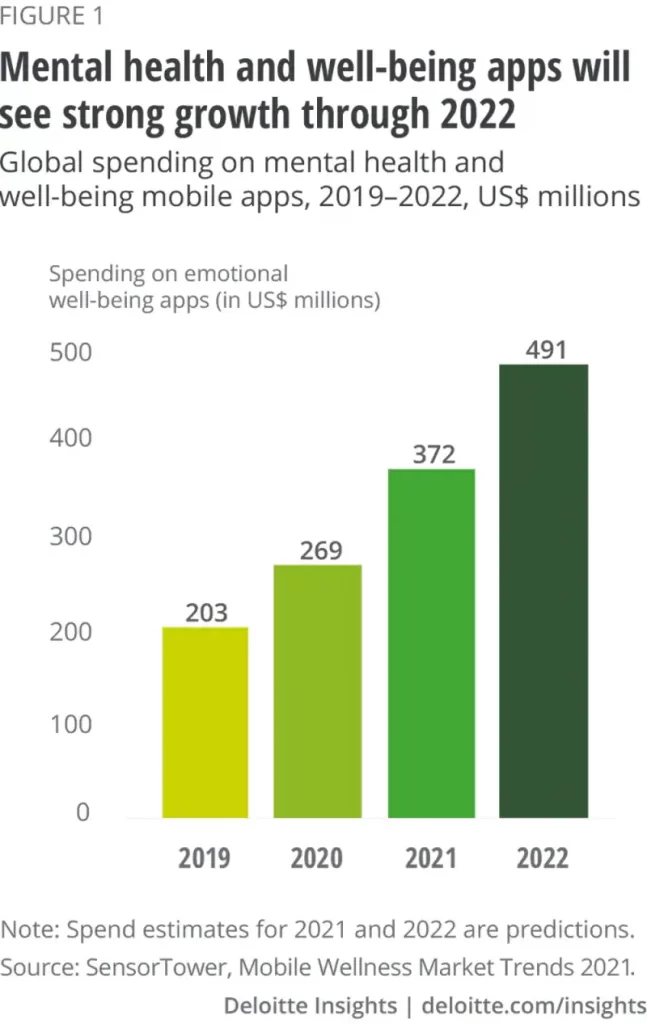
With technology opening new vistas for the human race, there has been a real surge in the popularity of mobile apps on mental health & wellbeing, paving the way for a relatively untapped domain to utilize the data and research on the field. Mobile devices like smartphones and tablets give doctors, patients, and researchers new ways to access help. They can find consultation, monitor progress, and increase understanding of mental wellbeing.
Mental health care doctors can use apps for enhancing accessibility and care quality. Therefore, fitness app development companies are concentrating on developing mobile apps that are more user-friendly and offer as much support to the people needing it. As a result, they make treating options available to a higher number of people. This makes mental health care and wellbeing easier to manage for millions of consumers.
The global outlook for mental health apps was valued at $6.2 billion in 2022. The market is estimated to close in on a value of $30 billion by the end of 2032. It will thus have a surging CAGR of 17% during the same period. The market is rising because individuals have become more aware of the significance of mental health. In addition, the pandemic resulted in a spike in mental health app downloads with a heightened awareness of mental health. As a result, the digital and mobile health sectors have shown significant growth potential.
Therefore, the potential market opportunities for these apps are higher. Almost 800 million people globally, or 11% of the global population, have one or the other mental health condition. Moreover, research shows that the COVID-19 pandemic has further aggravated mental health concerns. It has led to a dramatic rise in the prevalence of problems like depression, anxiety, PTSD, and stress.

Today, there are not less than 20,000 mental health apps, with two of the most popular being Calm and Headspace. They focus on mindfulness and meditation. They aim to help individuals get to support the way they get it by consulting therapists or other traditional mental health services. In addition, many mental health app developers and hybrid mobile app development companies are launching collaborations with other online services and apps like Snapchat and Bumble.
Creative research and engineering teams combine their skills to address a wide range of mental health concerns. Some popular areas include:
The mobile apps on mental health support that focus on the ‘self-management’ approach seem immensely popular. The user inputs information into the app to get feedback in these apps. For instance, the user can opt for medication reminders or use the app for developing tools to handle stress, uneasiness, anxiety, or insomnia. Some also come with additional features to track heart rate, breathing patterns, blood pressure, etc. These help the user follow to progress and receive feedback.
These skill-training apps often give the feel of gaming. For example, the user can watch an educational video about anxiety management or stress relief or the importance of social support. After that, the user might try new strategies and then use the app to track how often those new skills are practiced.
These days, there goes much effort into developing apps that can collect data using the inbuilt smartphone sensors. For example, these sensors can record movement patterns, social interactions, and behavior during the day. In the future, apps can analyze these data to determine the user’s real-time state of mind. The goal is to build apps that support a range of users, even including those with serious mental illnesses, fitness app development companies, and healthcare workers simultaneously.
The most significant benefit of building seamless and user-friendly mental health apps is that they help leverage the best of cutting-edge technology to support and treat patients and also pave the way for new clinical research. They present a unique opportunity to expand accessibility and quality of treatment.
There are some general features that most of the top-performing apps for mental health in the market currently share. These are:
The user profile offers a personalized profile creation option to each user. These include the choice of color scheme and inclusion of more functional aspects like wake up and sleep time to set out to determine when the app is most likely to be used. In addition, app users can update their profile with relevant personal details allowing an algorithm to match patients with therapists.
Apps should enable users to conduct self-monitoring like evaluating mood patterns for enhanced stress management and tracking symptoms and progress of patients.
A well-designed customized dashboard with integrated tracking functions can help display all gathered information in a much more comprehensible manner for patients and caregivers. It functions as a valuable information hub with all data in one place. It can also help doctors to create better treatment and patient monitoring plans. As a result, patients can now receive better care and greater attention-getting more engaged in their therapy.
Like all other apps, a mental health app can also serve its purpose fully if it engages with its users successfully. With the use of gamification elements like interactive games, multimedia access, and rewards for every milestone achieved, patients can be benefitted holistically.
Patients often look for notifications like updates or reminders for an upcoming appointment, notifying patients on the time of exercise or medicine, etc.
The community feature goes a long way in making the apps stand out from the crowd. It gives users the possibility of tracking and sharing their progress, thoughts, or situations with family or friends, consulting therapists, and getting support from groups of people that have gone through similar experiences.
To consult the mental health practitioners and certified experts, patients or app users must also have access to text messages or in-app messaging features like video calls and audio sessions.
Since seeking help for any mental health concern is one of the most critical and sensitive things, users must also have an emergency feature at hand to use it and get help, be it in the dead of night.
There are innumerable benefits to using mental health apps as users can take control of their health and feel empowered. In addition, app creators have enormous benefits as this is a growing market with great potential. So, there is no better time to try to harness the market than now! Get in touch with our team of skilled mobile app developers at Shyam Future Tech, who will effortlessly help you navigate the entire app development journey.